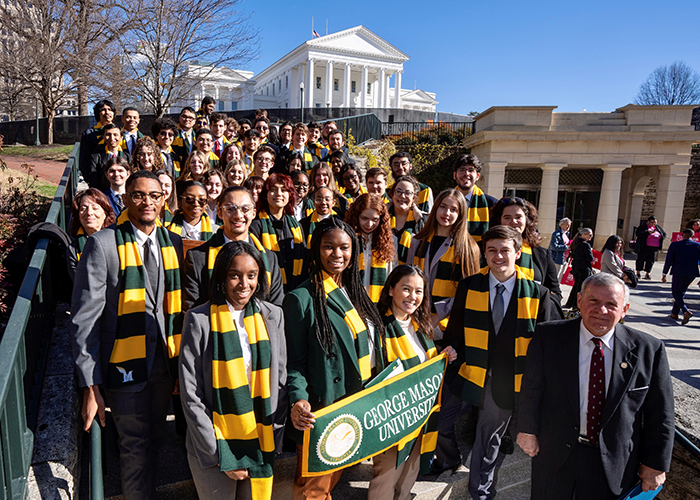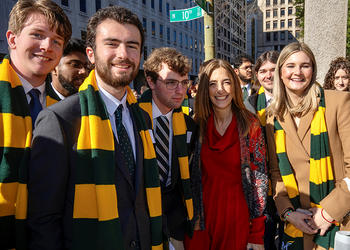

Late last month, George Mason University students descended en masse on the capital of the commonwealth to discuss with legislators the state-level issues about higher education that are important to them. The road trip to Richmond to meet with General Assembly representatives and staff members on Thursday, January 26, was the 11th Mason Lobbies Day, with 62 mostly undergraduates making the two-hour bus ride to the Capitol.
The day’s agenda, organized by Mason’s student government’s Government and Community Relations Committee, began with messages of welcome from Mason president Gregory Washington and Mason alums Senator Jeremy McPike (D), Delegate Charniele Herring (D), as well as Secretary of Education Aimee Rogstad Guidera (R).
The busy morning included a briefing by representatives from Mason’s government and community relations office, who provided pointers on how to successfully advocate. The itinerary also included substantive visits to legislators’ offices for meetings and a chance to sit in the Capitol gallery to watch government in action and be recognized from the floor.
Not surprisingly, given their majors in government, international politics, and public policy, many of the lobbyists-for-the-day were students at the Schar School of Policy and Government. Some of the Schar School scholars who made the trip said it was an eye-opening experience to see government at work first-hand—and, to their relief, to encounter a civil tone among the representatives.
“I was able to view the legislators from the TV viewing rooms,” said Zayd Hamid, a sophomore government and international politics (GVIP) major. Speaker Todd Gilbert (R), he said, “was impressive to behold on the floor even from a recording. His authoritative presence and firm understanding of procedure and decorum was indeed memorable.”
“This event was very inspiring for me,” said Gabriella Grabovska, a first-year GVIP student who arrived at Mason from her home in Ukraine in September. “Looking into how government really works and having conversations with senators gave me motivation and energy to work more in this field.”
Grabovska, whose perilous journey from Ukraine to Mason was recalled in President Washington’s opening remarks, said the day was a chance to “do our best for our school, our home, and our Mason Nation. Despite, the pressure of limited time and high responsibilities, we worked as a team, and we hope this will subsequently lead us to the greatest results.”
Funding for higher education was a common theme of discussion, said Hamid, who is a Mason Honors College Learning Community resident advisor.
He spoke with Delegate Michelle Maldonado (D) about several issues, including funding disparities relevant to Mason and Virginia institutions of higher education as a whole.
Armed with fresh statistics—"Virginia students aggregately pay in tuition, fees, etc., roughly 55.4 percent of their public institutions' revenues. This is 13.3 percent higher than the national average of 41.2 percent”—and the passion to impart them, Hamid said he “thoroughly communicated the figures presented alongside Mason's demographic information to present a stark contrast to Delegate Maldonado.”
Aside from funding, “we also discussed mental health support and faculty-staff support,” he added.
In the end, Hamid said, Maldonado was sympathetic to our concerns for a surprising reason: “We learned that her son is a freshman here at Mason, so the issues facing Mason hit close to home for her. She was very pleasant to talk to and gave us good advice on negotiation to help us reach our goals.”
The four hours on the bus and the several hours stalking the corridors of government buildings for back-to-back meetings is intense and can be daunting. But Grabovska, a member of the Schar School’s Democracy Lab Learning Community, said the outing “definitely strengthened student body bonds. We made new friends, helped each other, and while being professional, also had fun.”
The day at the capital was a success, said Rose B. Pascarell, the vice president of University Life, who made the trip with the students. “Our students were informed, they did their homework, and they came prepared to be strong advocates for Mason and for equitable and accessible higher education,” she said. “The event was designed to be a master class in civic engagement and individual advocacy—and it was.”
For Hamid, the experience may be a lasting one.
“I believe it will influence my studies,” he said. “I've worked in local government before as an intern to my hometown's Department of Housing, Zoning, and Code Enforcement, but state government felt entirely different to that work. The hustle and bustle of the halls, the accessibility of the legislators to the public and the interest groups that have stakes in legislation, and the general atmosphere of the House of Delegates was altogether surreal.
“I would be interested in pursuing a future internship in state government to gain more worthwhile experiences in Richmond.”
